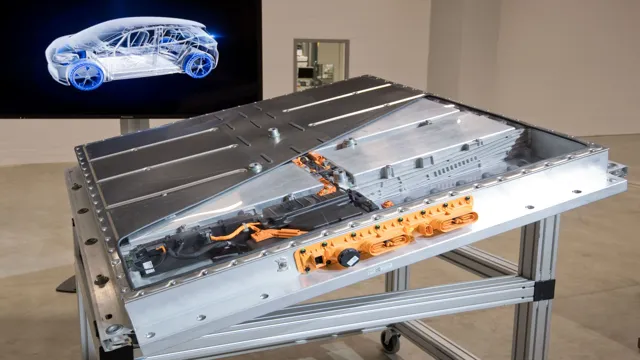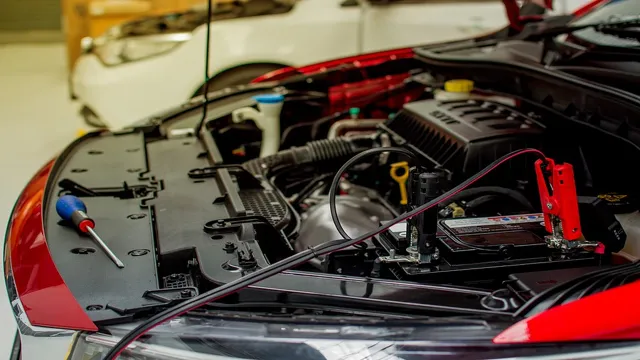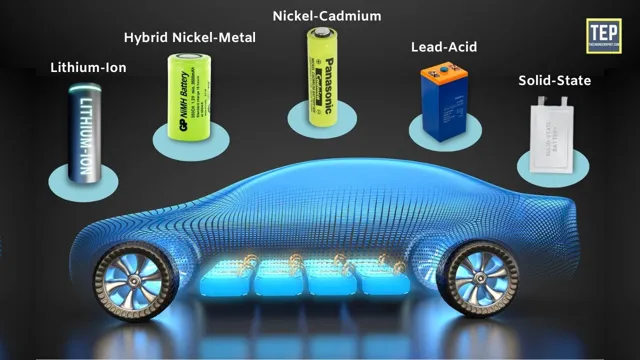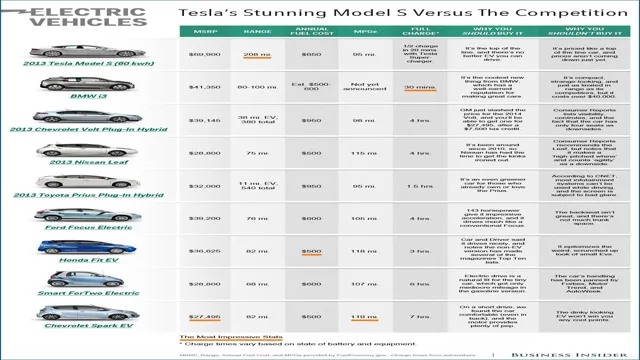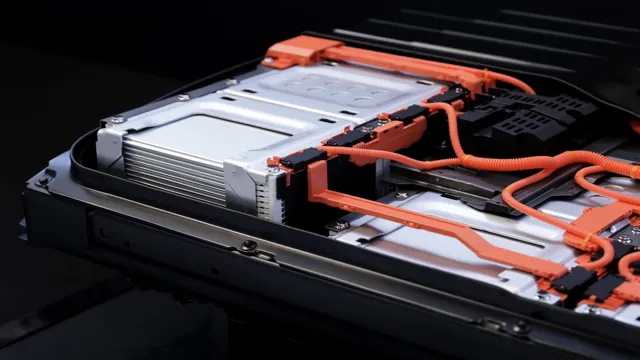Breaking the Electric Car Battery Myth: Yes, You Can Replace Your EV Battery!
Have you ever wondered about the battery life of an electric car? With the increasing number of electric cars on the road, it’s an interesting topic to explore. One of the concerns of owning an electric car is the worry of running out of charge during long drives. But what about when the battery finally reaches its limit and needs to be changed? Is it a complicated process? Let’s take a closer look at changing the battery in an electric car.
Electric cars are designed differently than their gasoline counterparts, so naturally, the battery replacement process is different as well. Unlike traditional cars, electric cars have a battery pack instead of a single battery. The battery pack is made up of many small batteries connected together, so when one battery fails, the entire pack needs to be replaced.
While the idea of replacing an entire battery pack may seem daunting, it’s actually a straightforward process. However, it’s not something that can be done at home like changing a tire or an oil filter. Electric car batteries are extremely heavy and require specialized equipment to lift and move them.
Therefore, the replacement process needs to be done by a trained technician at a dealership or a specialized service center. The good news is that electric car batteries are designed to last much longer than traditional car batteries. In fact, most electric car batteries are guaranteed for a specific amount of time, typically between 8-10 years.
So, while the replacement process may not be something you’ll need to worry about often, it’s still important to know what to expect when the time comes. Overall, while the battery replacement process for an electric car may not be something you’ll do yourself, it’s not complicated to have done. The most important thing is to have the battery replaced by someone who is trained in working with electric car batteries.
With proper care and maintenance, your electric car’s battery should last for many years.
Understanding Electric Car Batteries
One of the common concerns of people who are considering buying an electric car is the durability of the battery. While electric car batteries are designed to last for a long time, they do degrade over time due to factors such as temperature, usage, and charging patterns. Fortunately, replacing an electric car battery is possible, but the process can be expensive and time-consuming.
Additionally, not all manufacturers offer a straightforward replacement program for their electric car batteries. Therefore, it is important to do your research before deciding to replace an electric car battery. However, with proper care and maintenance, electric car batteries can last for many years, making them a reliable and eco-friendly alternative to traditional gas-powered vehicles.
Types of Batteries for Electric Cars
Electric car batteries come in a variety of types, each with its own strengths and limitations. Understanding these batteries is essential for choosing the right electric vehicle for your driving needs. Lithium-ion batteries are the most common type of battery used in electric cars today due to their high energy density and relatively low cost.
However, there are also other types of batteries, such as nickel-metal hydride (NiMH) and lead-acid batteries. NiMH batteries are less expensive than lithium-ion batteries but are not as energy-dense. Lead-acid batteries are relatively inexpensive and have been used in electric vehicles for many years but are heavy and have a shorter lifespan than other battery types.
Selecting the appropriate type of battery for your electric car depends on your usage and driving range needs. It is important to research and test drive different models to determine which battery type fits your lifestyle and budget.
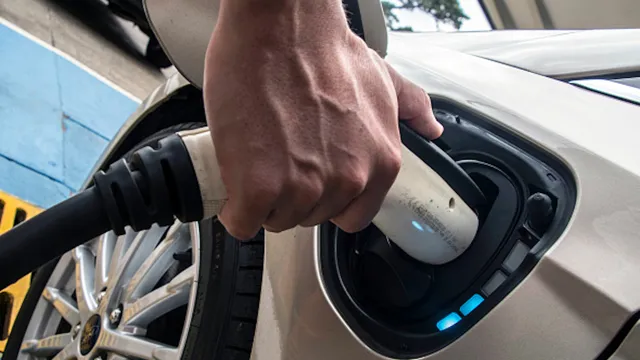
How Electric Car Batteries Work
Electric car batteries are a crucial component of electric vehicles as they store and provide power to the motor. The most common type of electric car battery is the lithium-ion battery, which is made up of several cells that contain electrodes, electrolytes, and a separator. The battery works by using a chemical reaction between the electrodes and the electrolytes to produce electricity.
When the car is plugged in, the battery charges by sending an electric current through the cells, which causes ions to move from the cathode to the anode. This process is reversed when the car is in use, as the ions move from the anode to the cathode, providing power to the motor. Solid-state batteries are also emerging as a new type of electric car battery, which offer significant benefits such as higher energy density, faster charging times, and increased safety.
As technology continues to advance, electric car batteries will become increasingly efficient, affordable, and accessible, driving the growth of electric vehicles and reducing carbon emissions.
When to Replace an Electric Car Battery
Can you change the battery in an electric car? Yes, you can. However, you don’t need to change it as frequently as you would in a gasoline car. Typically, electric car batteries last for around 100,000 miles without needing to be replaced.
That number can vary depending on how you treat the battery and how often you drive. The best way to extend the life of your electric car battery is to keep it charged between 20- 80% and avoid charging it to 100% or letting it go below 20%. Another factor that can impact the battery life is the climate.
Extreme heat or cold can reduce the battery’s life, and frequent fast charging can cause more wear. The good news is that changing an electric car battery is possible and can cost anywhere from $3,000 to $10,000, depending on the car model and battery type. However, before considering a battery replacement, try to get a professional evaluation since there could be other underlying battery problems that maintenance can solve.
Signs of a Failing Electric Car Battery
Electric car batteries are an essential component of any electric vehicle. They store the energy that powers the car’s motor and keeps it running. However, over time, these batteries may begin to show signs of wear and tear, which can lead to diminished performance and even complete failure.
Some common signs of a failing electric car battery include reduced driving range, slower acceleration, and increased charging time. If you notice any of these symptoms, it may be time to replace your battery. While the cost of a new battery can be high, it is crucial to maintain your electric car’s performance and ensure reliable transportation.
If you are unsure whether your battery needs replacement, consult with a trusted mechanic or electric car specialist who can evaluate your battery’s condition and provide guidance on what course of action to take. Remember, taking care of your electric car’s battery is just one part of ensuring the longevity and efficiency of your vehicle.
Average Lifespan of Electric Car Batteries
When it comes to the average lifespan of electric car batteries, there are a number of factors that can determine their longevity. Most experts agree that the average lifespan of an electric car battery is around 8-10 years, or roughly 100,000 miles. However, this can vary depending on a number of factors such as the make and model of the vehicle, how well the battery is maintained, and how often the battery is charged.
If you’re an electric car owner, it’s important to pay close attention to the health of your battery and to know when it’s time for a replacement. Signs that your battery may be on its way out include reduced range and slower charging times. Additionally, if you notice that your battery is losing its charge capacity more quickly than normal, it’s likely time for a replacement.
Replacing an electric car battery can be a costly expense, but it’s important to keep in mind that it’s a necessary investment in the long-term life of your vehicle. Additionally, some manufacturers offer warranties or battery replacement programs, so be sure to check with your manufacturer to see if you’re eligible for any discounts or support. In summary, electric car batteries can last anywhere from 8-10 years, but this can vary depending on a number of factors.
It’s important to monitor the health of your battery and know when it’s time for a replacement, as this can impact the overall performance and longevity of your vehicle. While replacing a battery can be costly, it’s a necessary investment in the long-term life of your electric car.
Factors That Affect Battery Life
When it comes to electric cars, the battery life is a crucial aspect to consider. Several factors can affect the battery life, including the temperature, driving habits, battery management, and age. The temperature plays a significant role in determining the battery life, especially extreme temperatures.
High temperatures can reduce the battery life, while low temperatures can decrease the performance of the battery. Driving habits such as rapid acceleration and frequent braking can also affect the battery life. Additionally, battery management, such as the method of charging and storing the battery, can also play a role in how long the battery lasts.
Lastly, the age of the battery can significantly impact its performance, and as it gets older, it may need to be swapped out. Generally, electric car batteries can last between 5-10 years, but it’s crucial to check the battery’s health regularly to determine when a replacement is necessary. If the battery’s capacity drops to 70 or 80%, that’s a good indication that it’s time to replace it.
Overall, paying attention to these factors can help ensure that electric car batteries last as long as possible, making it a worthwhile investment.
Replacing an Electric Car Battery
If you’re wondering if you can change the battery in an electric car, the answer is yes. However, it’s not as simple as just swapping out an old battery for a new one. The process can be costly, and not all car manufacturers offer battery replacement services.
Additionally, each car model may have a different type of battery, which can affect the cost and availability of replacements. Some electric car owners choose to extend their battery life by regularly maintaining it and avoiding extreme temperatures. Overall, swapping out an electric car battery is possible, but it’s important to do your research and consider the cost and availability carefully.
Finding a Good Mechanic for Electric Cars
When it comes to taking care of electric cars, finding a good mechanic is crucial. It’s not always easy to know who to trust with your electric vehicle, as not all auto repair shops are equipped to handle the unique needs of an electric car. That’s why it’s important to do your research and find a mechanic who specializes in electric vehicles.
Furthermore, if you need to replace an electric car battery, it’s essential to find a mechanic who has experience with this task. Electric car batteries are unlike traditional car batteries, and it takes a skilled professional to replace them safely and correctly. When searching for a mechanic, look for someone who has the necessary expertise and is knowledgeable about your specific make and model of electric car.
By finding a reputable mechanic, you’ll be able to keep your electric car running smoothly and efficiently for years to come.
Cost of Replacing an Electric Car Battery
Replacing an electric car battery can be costly, but it largely depends on the make and model of the vehicle. Make sure to do your research and compare prices before making any decisions. On average, the cost of a replacement electric car battery can range from $3,000 to $7,000.
However, some luxury electric car models could cost upwards of $20,000 for a new battery. It’s important to keep in mind that the lifespan of an electric car battery varies and can last anywhere between 5 and 20 years. Regular maintenance can help improve the lifespan of your battery, like avoiding extreme temperatures and maintaining proper charging habits.
Additionally, some manufacturers offer battery replacement programs or warranties, so make sure to check with your dealership or manufacturer to see if you qualify for any assistance. Overall, while the cost of replacing an electric car battery may seem high, it’s important to consider the long-term benefits of driving an environmentally-friendly vehicle.
Conclusion
In conclusion, the answer to the oft-asked question of whether you can change the battery in an electric car is a resounding ‘yes’! Much like any other vehicle, the battery in an electric car will eventually need to be replaced. However, it’s important to note that unlike traditional cars where you can simply swap out the battery, electric car batteries are a bit more complex and require professional expertise to ensure they are safely and effectively replaced. So while you may not be able to do it yourself, rest assured that a new battery is indeed a viable option for any electric car owner looking to get more life out of their vehicle.
“
FAQs
How often do you need to change the battery in an electric car?
The lifespan of an electric car battery varies, but it can typically last between 8-10 years before needing replacement.
Is it possible to replace the battery in an electric car on your own?
It is not recommended to replace the battery in an electric car on your own. It requires special equipment and knowledge, and should be done by a certified technician.
How much does it cost to replace the battery in an electric car?
The cost of replacing an electric car battery can vary depending on the make and model of the car. It can range from $3,000 to $10,000 or more.
Can you upgrade the battery in an electric car?
It is possible to upgrade the battery in an electric car, but it can be expensive. It is important to consult with a certified technician to see if it is feasible and cost-effective.
